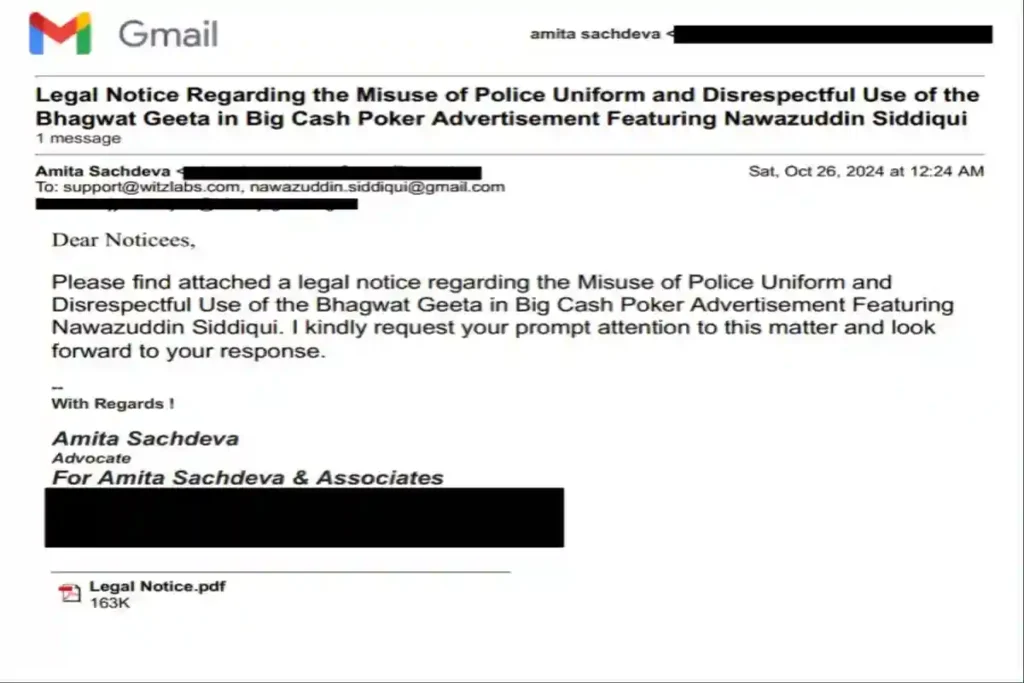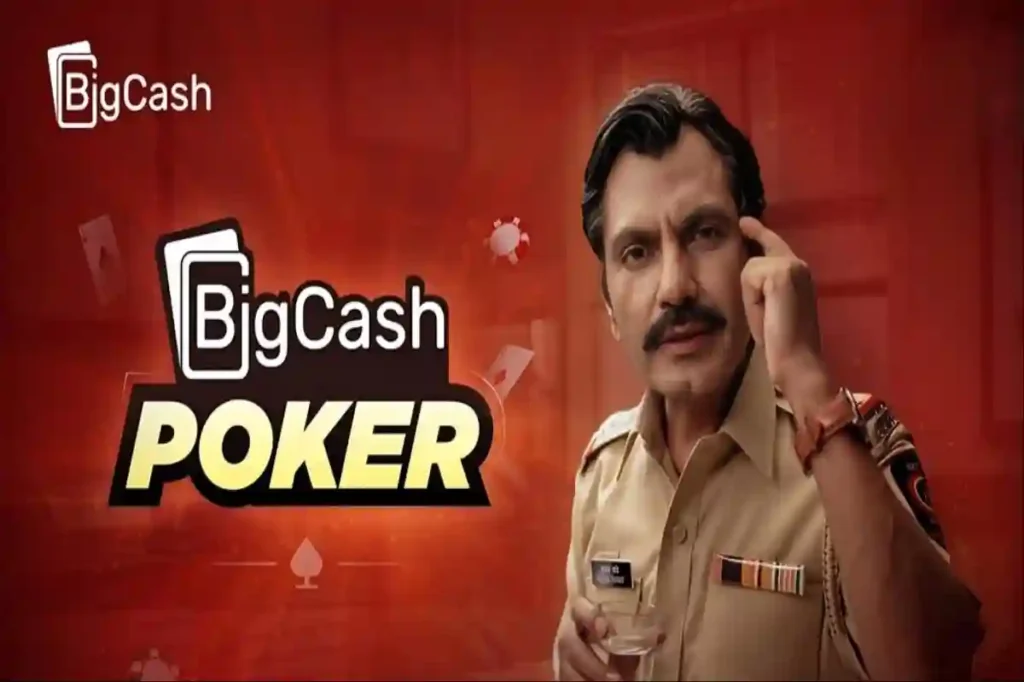In the past few years, Bollywood stars have been endorsing more and more online games. Well-known stars have put their names on ads for poker and real-money games. But the latest famous person to get in trouble for such a promotion is Nawazuddin Siddiqui, the famous actor. His recent Big Cash Poker ad sparked significant debate and infuriated the Hindu Janjagriti Samiti. This Hindu group is strongly against the ad, saying it shows disrespect for the Mumbai Police and encourages something they think is morally wrong.
Let’s investigate the source of the argument and why this advertisement has elicited such strong reactions.
Look At The Ad That Started It All
Nawazuddin Siddiqui, renowned for portraying intense and sometimes morally dubious roles, dons a police officer’s uniform in the aforementioned advertisement. He tells the crowd straight that he can handle criminals who try to get away by telling sad stories. Siddiqui then says that he is proficient at poker because he plays it every day. He also says that other people can get the same thrill and smart challenge from the Big Cash Poker app. People dislike this punchline because they believe it diminishes the importance of police work by tying it to a gaming app.
The Hindu Janjagriti Samiti, a group, claims that this type of organisation “tarnishes the image of the Mumbai Police.” They have sent an official letter to both the Mumbai Commissioner of Police and the Director-General of Police in Maharashtra to express their concerns. They demand adherence to the Maharashtra Police Act 1951 and the Maharashtra Civil Services (Discipline and Appeal) Rules 1979.
What’s Awful About This Nawazuddin Siddiqui Ad?
The primary issue lies in the depiction of a police officer engaging in actions that some individuals deem ethically dubious. India has legalized poker and other real-money gaming apps, and their popularity is growing. However, they are still controversial because of worries about gambling addiction and moral issues. Some people say that the ad goes too far by showing a police officer supporting these kinds of games, which hurts the public’s view of the police as honest and serious.
Bollywood Has A Long History Of Using Police Characters.
Bollywood has a long history of association with both good and bad police figures. Many famous Bollywood movies feature dishonest or mixed-moral police officers, and these characters have become beloved parts of pop culture. For example, in Karnan (2021), the main character fights a mean district police superintendent to keep his town safe. In Kantara 2022, a forest officer’s acts that aren’t clear-cut add tension to the plot. The well-received roles, such as Manav Vij’s in Andhadhun (2018), highlight a long-standing trend in movies.

Despite the complexity of these pictures and characters, they have not faced any criminal charges. However, this ad brings up new questions about whether or not it’s okay to show real people in ads, especially when money is at stake.
We Want The Police Commissioner To Answer For The Letter He Wrote
Abhishek Murukate, the Maharashtra state leader of Surajya Abhiyan, wrote the letter demanding action against Nawazuddin Siddiqui and Ankur Singh, the owner of Big Cash Poker. It said that they broke certain service rules and laws. Whether this letter transforms into a genuine lawsuit or merely serves as a show of support remains unclear. What is clear, though, is that this event has made the debate about famous endorsements even stronger, especially in areas like real-money gaming.
Bollywood stars usually get away with making up police officers for films, but promoting a product while wearing a police uniform seems to have caused a stir. Critics argue that if Nawazuddin’s role in this advertisement remains unquestioned, it could set a negative precedent.
The controversy surrounding celebrity endorsements is complex and multifaceted. In India, recommendations by famous people have a lot of power, but they are also very controversial. Bollywood stars such as Shah Rukh Khan, Akshay Kumar, and Ajay Devgn have faced significant criticism for their promotion of Vimal Elaichi, a product associated with tobacco. Although there was a backlash, the stars said their roles were “characters” in ads, not product endorsements.
The debate surrounding the Big Cash ad demonstrates a similar dynamic. Even though Nawazuddin Siddiqui’s character supports the app, that doesn’t mean he supports real-money betting. People still think that stars are responsible for the goods they promote, which often leads to harsh criticism and calls for accountability.
Do Poker And Real-Money Games Rely On “Skill”?
The nature of real-money gaming is an important point in this discussion. A lot of online casinos say that poker, like chess or cards, is not a game of luck but of skill. Some people who like poker think that skilled players can use strategic thinking to regularly win, which is what makes poker different from other types of gambling.
The legality of real money gambling varies among Indian states. Some states let people play games for real money, but others strictly prohibit it because they see it as gambling. Due to the complexity of the law, numerous court cases have arisen, each potentially setting a new standard for the law. If the case against Big Cash and Nawazuddin Siddiqui goes forward, it could make the law in India about real-money gambling even clearer or more complicated.
An Imaginary Court Case For Nawazuddin Siddiqui
The outcome of the court case could have long-lasting effects. If the courts agree with the claim that Siddiqui’s portrayal hurts the public’s view of the police, it could set a standard that limits how actors can portray certain jobs in ads.
Another thing this case could do is make people less likely to trust famous endorsements, especially in fields that are already under a lot of ethical scrutiny. If celebrities can’t legally promote controversial goods like real-money gambling apps, it might change how they work with brands, which could make advertising more cautious.
Setting Limits For Celebrity Endorsements Has A Greater Impact.
As real-money gaming gains popularity, the promotion of it is likely to encounter more challenges. Nawazuddin Siddiqui’s Big Cash Poker ad is one of the few that has truly shed light on moral and social issues. It’s challenging to find the right mix between artistic freedom, public duty, and the influence of celebrities. Events like this one show how important it is to have clear rules.
Currently, the focus remains on Nawazuddin Siddiqui and the individuals behind Big Cash Poker. It’s not clear what will happen in court with this case, but it has started a new conversation about the duties of public people and the moral limits of ads in India.
What’s Next?
It will be fascinating to see how Bollywood and advertising standards change as this case goes on. What do you think? Will this event lead to stricter rules for ads that show real-money gambling, or will it make companies more careful? India’s legal system may soon have to decide what the limits are on star endorsements and how to use public personas in an ethical way in a digital economy that is always changing.
Currently, Nawazuddin Siddiqui and Big Cash Poker are at the centre of a heated discussion. This shows how one ad can have a bigger effect on how people think about online gaming, the responsibility of celebrities, and how the media portrays things. The outcome could significantly alter the endorsement of celebrities in India during the digital era.
Follow POKERBOL for more updates.

